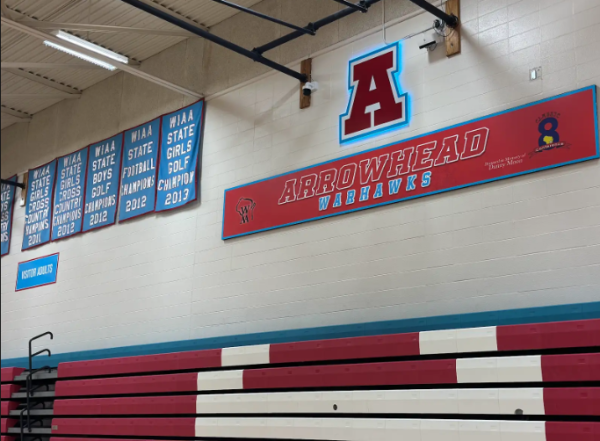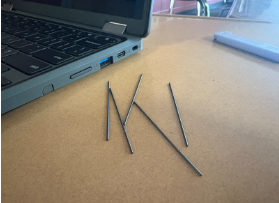How Does A Cup Of Joe Affect Teens?

Teenagers at Arrowhead High School often need a quick fix for their fatigue during late night studying. The solution is usually a cup of coffee in the AM. And Arrowhead has our very own coffee shop to provide that caffeine.
The Arrowhead school cafe opens first hour and remains open up until fourth hour. Their average prices range from $1 to $3, and their “popular item to serve, is the Chocolate Mocha frappe,” says senior Lindsay Toth, an avid customer at the schools coffee shop.
“It’s super helpful to have a coffee shop right in the school. I get a cup every morning before class. Without my coffee, I would not be able to focus or wake up at all throughout the school day,” says junior Sara Janke.
According to sleepfoundation.org, teenagers 14 and up typically go to bed around 10:30pm or 11:00pm. But stressed out teens usually go to bed around 1:00am to 2:00am.
“When you’re staying up until 2:00am every night working on homework and getting up four hours later, I definitely have my coffee to go the second I wake up. I’d say I have about two cups of coffee a day,” says senior Andi Eckl.
“I definitely choose to go to bed with fewer hours of sleep if it means I will finish my homework or study and receive a better grade. I just wake up and revive myself with a cup of coffee,” says senior Alli Kroeninger.
Sleepfoundation.org says caffeine consumption can result in sleep disturbances, like staying up too late, and it also prevents teens from getting the recommended nine hours sleep they need to feel well-rested. This affects their performance at school and in other activities.
Roland Griffiths, a caffeine expert and a professor of psychology and neuroscience at John Hopkins University, states the following from sleepfoundation.org: “Caffeine is likely the world’s most used mood altering drug and it does produce mood changes and physical dependence and withdrawal. It needs to be recognized as a drug.”
Not only do studies suggest that caffeine is known to disrupt teens’ sleep cycles–which can lead to issues like poor moods, aggression, impulsiveness, and loss of behavioral control–but Griffiths also adds that, “caffeine withdrawal can trigger headaches, lethargy, inability to concentrate, irritability, depression, mood changes, and in some cases, nausea, vomiting or achy flu like symptoms.”
This rings true for AHS senior Maddie Hemmer. She says, “I drink more coffee than my mom and dad. I need coffee in order to keep myself going throughout the day. If I go a day without coffee, I have terrible headaches, fatigue and overall [I] don’t feel very well.”
However, sleepfoundation.org also states that parents and researchers might make the argument that a cup or two of coffee is not detrimental, and that it actually may be, in fact, beneficial. Caffeine can help students stay more alert during school hours as well as refuel and reenergize students for sporting events and practices.
Parents and teens alike also promote coffee shops as safe hangout places. They provide a social gathering spot that’s hip and trendy, such as Milwaukee Street Traders in Delafield and This Great Coffee Place in Hartland, that can also keep teens out of trouble and allow parents some peace of mind, states Lawrence Wilson, M.D. from sleepfoundation.org.
The benefits and drawbacks of teens drinking coffee remains strong and arguable. Regardless, some teens say they need caffeine to function throughout their school day and stay awake. Without it, Janke, Eckl, Kroeninger and Hemmer say they wouldn’t be able to last throughout the day.




